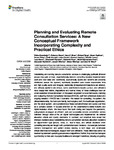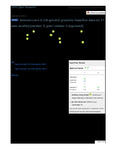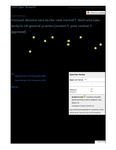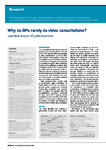Planning and Evaluating Remote Consultation Services: A New Conceptual Framework Incorporating Complexity and Practical Ethics
| dc.contributor.author | Greenhalgh, T | |
| dc.contributor.author | Rosen, R | |
| dc.contributor.author | Shaw, SE | |
| dc.contributor.author | Byng, R | |
| dc.contributor.author | Faulkner, S | |
| dc.contributor.author | Finlay, T | |
| dc.contributor.author | Grundy, E | |
| dc.contributor.author | Husain, L | |
| dc.contributor.author | Hughes, G | |
| dc.contributor.author | Leone, C | |
| dc.contributor.author | Moore, L | |
| dc.contributor.author | Papoutsi, C | |
| dc.contributor.author | Pope, C | |
| dc.contributor.author | Rybczynska-Bunt, S | |
| dc.contributor.author | Rushforth, A | |
| dc.contributor.author | Wherton, J | |
| dc.contributor.author | Wieringa, S | |
| dc.contributor.author | Wood, GW | |
| dc.date.accessioned | 2021-11-30T12:56:10Z | |
| dc.date.issued | 2021-08-13 | |
| dc.identifier.issn | 2673-253X | |
| dc.identifier.issn | 2673-253X | |
| dc.identifier.other | 726095 | |
| dc.identifier.uri | http://hdl.handle.net/10026.1/18428 | |
| dc.description.abstract |
<jats:p>Establishing and running remote consultation services is challenging politically (interest groups may gain or lose), organizationally (remote consulting requires implementation work and new roles and workflows), economically (costs and benefits are unevenly distributed across the system), technically (excellent care needs dependable links and high-quality audio and images), relationally (interpersonal interactions are altered), and clinically (patients are unique, some examinations require contact, and clinicians have deeply-held habits, dispositions and norms). Many of these challenges have an under-examined ethical dimension. In this paper, we present a novel framework, Planning and Evaluating Remote Consultation Services (PERCS), built from a literature review and ongoing research. PERCS has 7 domains—the reason for consulting, the patient, the clinical relationship, the home and family, technologies, staff, the healthcare organization, and the wider system—and considers how these domains interact and evolve over time as a complex system. It focuses attention on the organization's digital maturity and digital inclusion efforts. We have found that both during and beyond the pandemic, policymakers envisaged an efficient, safe and accessible remote consultation service delivered through state-of-the art digital technologies and implemented via rational allocation criteria and quality standards. In contrast, our empirical data reveal that strategic decisions about establishing remote consultation services, allocation decisions for appointment type (phone, video, e-, face-to-face), and clinical decisions when consulting remotely are fraught with contradictions and tensions—for example, between demand management and patient choice—leading to both large- and small-scale ethical dilemmas for managers, support staff, and clinicians. These dilemmas cannot be resolved by standard operating procedures or algorithms. Rather, they must be managed by attending to here-and-now practicalities and emergent narratives, drawing on guiding principles applied with contextual judgement. We complement the PERCS framework with a set of principles for informing its application in practice, including education of professionals and patients.</jats:p> | |
| dc.format.extent | 726095- | |
| dc.format.medium | Electronic-eCollection | |
| dc.language | eng | |
| dc.language.iso | en | |
| dc.publisher | Frontiers Media | |
| dc.subject | remote consultations | |
| dc.subject | video consultations | |
| dc.subject | evaluation | |
| dc.subject | telephone consultations | |
| dc.subject | E-consultations | |
| dc.subject | PERCS framework | |
| dc.subject | complexity | |
| dc.title | Planning and Evaluating Remote Consultation Services: A New Conceptual Framework Incorporating Complexity and Practical Ethics | |
| dc.type | journal-article | |
| dc.type | Article | |
| plymouth.author-url | https://www.ncbi.nlm.nih.gov/pubmed/34713199 | |
| plymouth.volume | 3 | |
| plymouth.publication-status | Published online | |
| plymouth.journal | Frontiers in Digital Health | |
| dc.identifier.doi | 10.3389/fdgth.2021.726095 | |
| plymouth.organisational-group | /Plymouth | |
| plymouth.organisational-group | /Plymouth/Faculty of Health | |
| plymouth.organisational-group | /Plymouth/Faculty of Health/Peninsula Medical School | |
| plymouth.organisational-group | /Plymouth/REF 2021 Researchers by UoA | |
| plymouth.organisational-group | /Plymouth/REF 2021 Researchers by UoA/UoA03 Allied Health Professions, Dentistry, Nursing and Pharmacy | |
| plymouth.organisational-group | /Plymouth/Research Groups | |
| plymouth.organisational-group | /Plymouth/Research Groups/FoH - Community and Primary Care | |
| plymouth.organisational-group | /Plymouth/Research Groups/Institute of Health and Community | |
| plymouth.organisational-group | /Plymouth/Research Groups/Institute of Translational and Stratified Medicine (ITSMED) | |
| plymouth.organisational-group | /Plymouth/Research Groups/Institute of Translational and Stratified Medicine (ITSMED)/CCT&PS | |
| plymouth.organisational-group | /Plymouth/Research Groups/Plymouth Institute of Health and Care Research (PIHR) | |
| plymouth.organisational-group | /Plymouth/Users by role | |
| plymouth.organisational-group | /Plymouth/Users by role/Academics | |
| dc.publisher.place | Switzerland | |
| dcterms.dateAccepted | 2021-07-19 | |
| dc.rights.embargodate | 2021-12-1 | |
| dc.identifier.eissn | 2673-253X | |
| dc.rights.embargoperiod | Not known | |
| rioxxterms.versionofrecord | 10.3389/fdgth.2021.726095 | |
| rioxxterms.licenseref.uri | http://www.rioxx.net/licenses/all-rights-reserved | |
| rioxxterms.licenseref.startdate | 2021-08-13 | |
| rioxxterms.type | Journal Article/Review |





